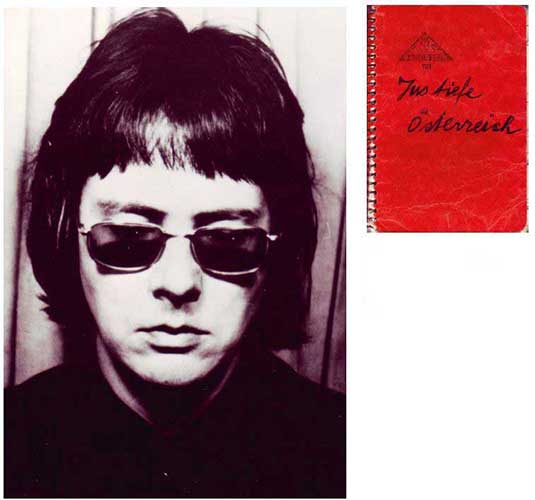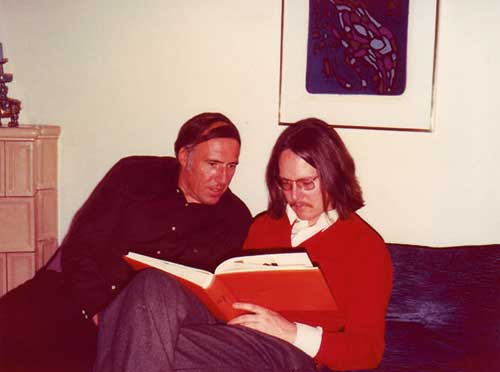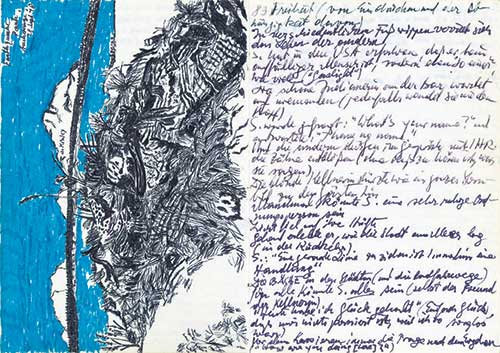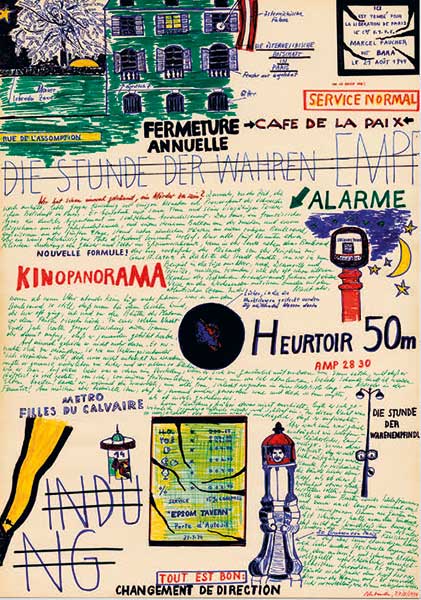Peter Handke
Nobel Lecture
Peter Handke delivered his Nobel Lecture in Literature on Saturday 7 December 2019 at the Swedish Academy in Stockholm.
English
English [pdf]
Swedish
Swedish [pdf]
German
German [pdf]
© THE NOBEL FOUNDATION 2019
General permission is granted for the publication in newspapers in any language after December 7, 2019, 5:30 p.m. CET.
Publication in periodicals or books otherwise than in summary requires the consent of the Foundation. On all publications in full or in major parts the above underlined copyright notice must be applied.
7 December, 2019
“Play the game. Don’t make it all about you. Look for challenges. But don’t aim for a specific outcome. Eschew ulterior motives. Hold nothing back. Be gentle and strong. Get involved, and the hell with winning. Don’t over-analyze, don’t calculate, but stay alert, alert for signs. Be vulnerable. Show your eyes, invite others to look deep; make sure there’s enough space, and try to recognize everyone’s own image. Make no decisions you don’t feel excited about. Let yourself fail. Above all, give yourself time and take the long way round. Never ignore what a tree or a body of water has to tell you. Turn in where you drawn to do so, and give yourself permission to bask in the sun. Never mind your relatives, offer support to strangers, bend down to look at trifles, duck into deserted places, don’t fall for the high drama of destiny, laugh conflict to bits. Show your true colors till you prove to be right, and the rustling of leaves turns sweet. Walk about the villages.”
Those words were spoken almost forty years ago by a woman to a man at the beginning of a long dramatic poem to which I gave the title of Walk About the Villages.*
In my childhood, when the time came and when time allowed, my mother would tell me, time and again, about people from the village—called Stara Vas in Slovenian, Altes Dorf [Old Village] in German: not stories, but short narratives that sounded, at least to my ears, like “unique occurrences,” to use Goethe’s phrase. It’s possible that my mother shared these accounts with my siblings, too. But in my memory, I was always her sole audience.
One of the occurrences went like this. On a local farm, halfway into the mountains, a mentally retarded girl worked as a milkmaid. In those days people called her “feeble-minded.” This girl was raped by the farmer and gave birth to a baby boy, but the farmer’s wife raised the child as her own. The girl, the actual mother, had strict orders to stay away from the little boy. For all he knew, the farmer’s wife was his mother. And one day the boy, still very young but already talking, was playing by himself near a barbed wire fence on the edge of the farm and got caught in the wire. The more he struggled, the more tangled he became. He screamed and screamed, until the retarded milkmaid, the “feeble-minded” girl, or, as my mother called her in the dialect spoken between the Saualpe and Karawank ranges, the Treapn, came running. In no time she’d unhooked the little boy. When the little boy’s presumed mother finally hurried to the spot, while the maid was already back at work, in the barn or out in the fields, the child asked, “Mother, how come the Treapn has such gentle hands?”
In Short Letter, Long Farewell,* this incident became a song, a ballad sung one night in a bar in Philadelphia, Pennsylvania, with the singer’s exclamation repeated at the end of every stanza, “And that child was me! That child was me!”
Most of the other occurrences my mother described to me involved members of her immediate or extended family, and almost always the main person was one of her two brothers who had later “fallen on the field of honor” in the Second World War. Let me try to reproduce two of these episodes, brief but decisive for my life as a writer.
The first episode dealt, and deals, with my mother’s younger brother, the youngest of the children in the household, and it takes place between the wars, in 1936, let’s say. It was a night in mid-autumn, a while before dawn, and Hans, or, in village’s Slovenian, Janez or Hanzej, had been away from home for a month, enrolled in the Marianum, a boarding school for boys preparing to study for the priesthood. The school was located about forty kilometers to the west, in Klagenfurt/Celovec, the capital of Carinthia. The farm lay in deep silence, the first cock’s crow still a long way off. And now, out of nowhere, the sound of sweeping in the courtyard. And who should be sweeping, and sweeping, and continuing to sweep the courtyard in the dark but the family’s Benjamin, hardly more than a child. And what had made him come all this way from town, in the middle of the night, was homesickness, domotožje in Slovenian (without a definite article). He was an excellent student, by the way, one who loved learning, but in the early hours of the night he’d climbed out a ground-floor window of the school and followed the highway, in those days still unpaved, all the way home. But instead of going inside—the doors were never locked—he took the broom and started sweeping the courtyard. In my mother’s telling, the day was “a Saturday”, the day before Sunday, “and on Saturday it was the rule: the courtyard had to be swept”. And he swept and swept, until the day gradually broke, and someone in the family—in my imagination it’s not one of his parents but his sister—made him come inside. He never returned to the Bishop’s School for Boys. Instead he went to the next village and did an apprenticeship in carpentry or cabinetry. This occurrence, having undergone a natural transformation, spontaneously, as it were, turns up time and again, from the outset, in my books—my narrative excursions or one-man expeditions.
With the second occurrence, no such metamorphosis took place, but if God, or fate, or whatever, so wills, it might have one yet. After the book I called Repetition, a Second Repetition.*
At the end of August or the beginning of September 1943, my mother’s other brother, the oldest, came home for a couple of weeks on furlough from the Russian front in the Crimea. And as he got off the bus he ran into the person responsible in that area for delivering bad news from the war. This man was on his way to the village to bring word to the family that the youngest brother had “died a hero’s death for the Fatherland” on the tundra. And since the death messenger had now unexpectedly run into a member of the household, he figured he could spare himself the visit. He simply handed the notice to the soldier on leave. But then this is what happened: Gregor made his way home, where he was received with cheers and shouts of joy—as a young woman, my mother was much given to expressions of joy—but during his entire leave he breathed not a word to the family about the death of his brother, or, as he had called himself in his letters home, “tundra boy.” As my mother described it, Gregor, who in peacetime had been a “real home-body,” during his entire leave avoided the house, his parents, his sister[s], even his village, Stara Vas, instead roaming around day and night, sometimes even staying out all night, in the neighboring villages of Encelna Vas, Lipa, Ruda, Globasnica, Diekše, Rinkolah, and Krcanje, where, in the company of acquaintances or complete strangers he “cried his eyes out.” Cried his eyes out—the one-eyed soldier? – Nah! “The crying never stopped. Must’ve never stopped.” And not until the last day, when he was walking to the bus to return to combat, did he hand the death notice to his sister, the only family member he’d allowed to accompany him. And a few weeks later, he, too, was “interred in foreign soil, may it lie lightly upon him”, according to the death notice, words later repeated on the memorial plaque in the village cemetery.
In the final scene of the dramatic poem Walk About the Villages, which is set in a cemetery, the woman who spoke at the beginning turns to the man, the secondary character, but primarily to the other characters in the play, the main characters, the sister and brother who’ve declared war on each other and on themselves as well, and this woman called Nova, who always finds it hard to speak, utters these words:
“It’s just me, offspring of another village. But this you may all be sure of: through me speaks the spirit of a new age, and that spirit has the following to say. Yes, there is danger, and that alone enables me to speak the way I’m going to speak: in resistance. So listen to my Dramatic Poem. You’re right to stop living in a daze, but don’t go waking each other like a pack of barking dogs. No one among you is to blame, and precisely in your fits of despair you may have realized that you’re not really in despair. If you were in despair, you’d be dead already. So don’t act as if you’re all alone. True, your story offers no comfort you can rely on. But stop brooding over to-be-or-not-to-be: being is, and will continue to be, conceivable, and not-being isn’t conceivable. Recognize how alike you are; recognize that you’re alike. It’s just me saying that. But I’m not merely me. “I” in these two guises can be the most flimsy and ephemeral thing on earth, and at the same time the most all-encompassing—the most disarming. “I!” am the only hero—and you should be the disarming ones. Yes, that “I” is the essence of human nature that keeps us human! War is far from here. Our armies don’t stand gray on gray on gray tarmac but yellow on yellow in flowers’ yellow throats. Bowing to show respect to a flower is possible. A bird on a branch can be spoken to. So in a world wrecked by artificial colors, make room for the colors of nature that can revive it. The blue of mountains is real—the brown of a gun holster isn’t; and the person or thing you think you know from television you don’t really know. Our shoulders exist for the sky, and the path from the earth to the sky has to pass through us. Move slowly, and in that way become the form without which no distance can take shape. Nature’s the only promise you can rely on. Yet nature can be neither refuge nor escape. Nature does provide a gauge, however: it just has to be checked daily. The clouds passing overhead, even when they race by, slow you down. Who says you must crash and burn? Haven’t you put your war behind you? Well, bolster the peaceful present and display the serenity of survivors. What looked from a distance like a menacing death’s head turns out to be child’s play when you come closer. Air out your thousand-year-old bed. Ignore the childhood-distant doubters. Don’t wait for another war: true peace-lovers can be found in the presence of nature. Don’t show your descendants the devil’s profile. The house of strength is in the other’s face. Here and now is the festival of gratitude. So let it not be said of you that you failed to take advantage of peace: let your labor work wonders—pass it on. But only those who love pass it on: love just one—that suffices for all. In loving you, I awake to myself. Even when most can’t be uplifted, be upliftable. Avert your eyes from the bestial two-legged creatures. Be real. Follow the caravan music. Walk until the vanishing lines emerge from the confused tangle, so slowly that the world becomes yours anew, so slowly that it becomes clear how it doesn’t belong to you. Yes, always keep your distance from power that parades itself as power. Don’t complain that you’re alone—be even more alone. Pass along the rustling. Describe the horizon, lest the beautiful dissolve into nothing again. Describe life-images to one another. What was good deserves to exist. Take your time—and be creative: transform your inexplicable sighs into mighty songs. Our art must aim to cry out to the heavens! Let no one talk you out of beauty—the beauty we humans create is what shakes us to the core. Devote yourselves to demystification, which at the same time reveals the One Mystery. Take note: whenever a child coming toward you stares at you aghast, you are the cause. To take on many disguises will be your destiny, and to prefer a jolly swindle to a truth made public. Play the farces of everyday life. Losing oneself is part of the game. (And yet: only the one who wears no mask marches proudly.) Go forth into the unknown regions of the earth and let those without illusions grin maliciously: illusion provides the strength for visions. Yes, let yourselves be pierced by yearning for form and pass along the healed world—the scornful laughter you receive stems from ignorance; it’s the death rattle of soul-cadavers. The dead give you extra light. Don’t worry if you can’t talk to them: one syllable suffices. But keep our unborn in your thoughts. Beget the child of peace! Save your heroes! They should be the ones to proclaim: War, leave us in peace! You people from here: you’re in charge. Don’t let anyone convince you that you’re the sterile ones at the end of days. We’re as close to the original source as ever. Perhaps there are no wildernesses left. But that which is wild, that which is always new continues to be: time. The ticking of clocks means nothing. Time is the vibration that helps us get through this accursed century. Time: I have you! The blessed day is now. Working effectively you can feel it. Perhaps there is no such thing as rational belief, but there’s rational belief in the divine shudder. Behold the miracle and forget it. Take the great leap. Joy is the only right form of power. Not till you feel joy will all be well with the world. – It’s still true that in the story we all share there’s no comfort we can rely on. Who’s measuring? The child-murderers in power vanish, unpunished. Peace and quiet doesn’t last: the trickling fountains collapse into barricades. Hope is the false wingbeat. Killjoys are everywhere. As we walk beneath the sun of joy, we drink deep of bitterness. Dear folks from here: The cries of dread will go on forever. Your pleading for mercy will merely elicit the thumbs-down sign. So pull yourselves together and look at the man in a dark suit and white shirt. Look at the woman across the river who’s standing on the balcony in the sun. Prove, with the means at your disposal, our human defiance! A blessing upon every kiss, however fleeting. And now each of you: back your seat. Fill the space with demonic energy, through repetition. Form is the law, and it lifts you up. Eternal peace is possible. Listen to the caravan music. Calculating and knowing, be heaven-bound. Hold fast to this dramatic poem. Walk ever onward. Walk about the villages.”
If the small occurrences my mother described provided the impetus for my almost life-long career as a writer, works of art gave me the essential forms, rhythms, or, to put it more modestly, the oscillations and oomph that allowed that impetus to find expression. I’m thinking not only of books but also of paintings, films (above all John Ford’s Westerns and Yasujiro Ozu’s “Easterns”), and songs (eventually, for instance, those of Johnny Cash and Leonard Cohen). The earliest oscillations and oomph, however, didn’t come from the arts; what stirred and thrilled me through and through as a child was the Slovenian-Slavic religious litanies I heard beneath the romanesque arches of the church near the birthplace, Stara Vas. And those at once monotonous and oh, so melodious invocations directed heavenward still stir and animate me at seventy-seven. They pluck the strings that accompany my further path as a writer, hum heavenly scales and cadenzas to me, soundless ones, as in the marvelously long Laurentian Litany to Our Lady, which contains perhaps a hundred epithets and invocations, of which I shall quote a few here, deliberately leaving them untranslated, with the exception of the repeated response “Prosi za nas”: “Pray for us”:
Mati Stvarnikova – prosi za nas
Mati Odresenikova – prosi za nas
Sadež modrosti – prosi za nas
Začetek našega veselja – prosi za nas
Posoda duhovna – prosi za nas
Posoda časti vredna – prosi za nas
Posoda vse svetosti – prosi za nas
Roža skrivnostna – prosi za nas
Stolp Davidov – prosi za nas
Stolp slonokosteni – prosi za nas
Hiša zlata – prosi za nas
Skrinja zaveze – prosi za nas
Vrata nebeška – prosi za nas
Zgodnja danica – prosi za nas
A few years ago I was in Norway, thanks to Henrik Ibsen. But now, in closing, I’m not going to speak of the playwright and his—and our—Peer Gynt, but rather of two Norwegian occurrences, as small as they are unique. The first involves one of the five or six bodyguards with whom I had the pleasure of spending an entire afternoon and evening. It was late at night, and we were sitting in a quiet bar on Oslo’s waterfront, when that man recited a few poems, first in Norwegian, then in English, that he had stored on his mobile telephone, and all of them were love poems, very tender ones. And on one of the following evenings, which I spent wandering, alone at last, through the empty midnight streets of Oslo (or Kristiania, as the capital was still called in young Knut Hamsun’s book Hunger), I saw a man’s silhouette in front of the lit-up display window of a bookstore. When I was standing beside him, he turned to me, at the same time pointing to one of the books in the window. “Look: my first book!” he said. “Published today! The first day!” This person was young, not much more than a child, or a textbook example of a “youth.” And he was happy—as only a child can be happy. And the joy he radiated, this author, this creator, warms me still. May it never go cold!
So let me use this moment to send greetings to those two, the man on the Oslo waterfront and the youth by the bookstore window, west of here or wherever they may be. Perhaps I should regret that I can’t recite any of my bodyguard’s love poems; I did jot down some of them that evening, but then lost the slip of paper. But in its place, here is a different poem, that of a soulguard (forgive the play on words):
[ A recitation in Swedish of the poem ”Romanska bågar” by Tomas Tranströmer. ]
Translated from the German by Krishna Winston
* All excerpts in the Nobel Lecture are translated by Krishna Winston.
The Long Way Round : A Dramatic Poem / translated by Ralph Manheim. London : Methuen Drama, 1989. Translation of: Über die Dörfer, 1981
Walk About the Villages / translated by Michael Roloff. Riverside, Calif. : Ariadne Press, 1996. Translation of: Über die Dörfer, 1981
Short Letter, Long Farewell / translated by Ralph Manheim. New York : Farrar, Straus and Giroux, 1974. Translation of: Der kurze Brief zum langen Abschied, 1972
Repetition / translated by Ralph Manheim. London : Methuen Minerva, 1988. Translation of: Die Wiederholung, 1986

Figure 1. Peter Handke 1968 and one notebook ”Ins tiefe Österreich” (1976–1977).

Figure 2. Publisher Siegfried Unsel and Peter Handke.

Figure 3. Notebook (1978).

Figure 4. Drawing (1974).
Copyright © The Nobel Foundation 2019
Nobel Prizes and laureates
Six prizes were awarded for achievements that have conferred the greatest benefit to humankind. The 12 laureates' work and discoveries range from proteins' structures and machine learning to fighting for a world free of nuclear weapons.
See them all presented here.
